Quantum Computing Advancements and Future Generation Impact
VerifiedAdded on 2023/06/03
|13
|3567
|311
Literature Review
AI Summary
This paper explores the advancements in quantum computing since the 1980s, focusing on its potential to revolutionize computation by leveraging quantum mechanical principles. It highlights key milestones such as the development of multi-qubit computers and the emergence of companies like D-Wave. The study aims to address the limitations of classical computers and the transformative impact quantum computers could have on data processing speed, security, and various applications, including quantum communication and cryptography. The research employs a qualitative method, drawing on scholarly articles and journals to analyze the progress in quantum computing and its anticipated implications for future generations, while also acknowledging challenges like decoherence that need to be overcome for its successful implementation.
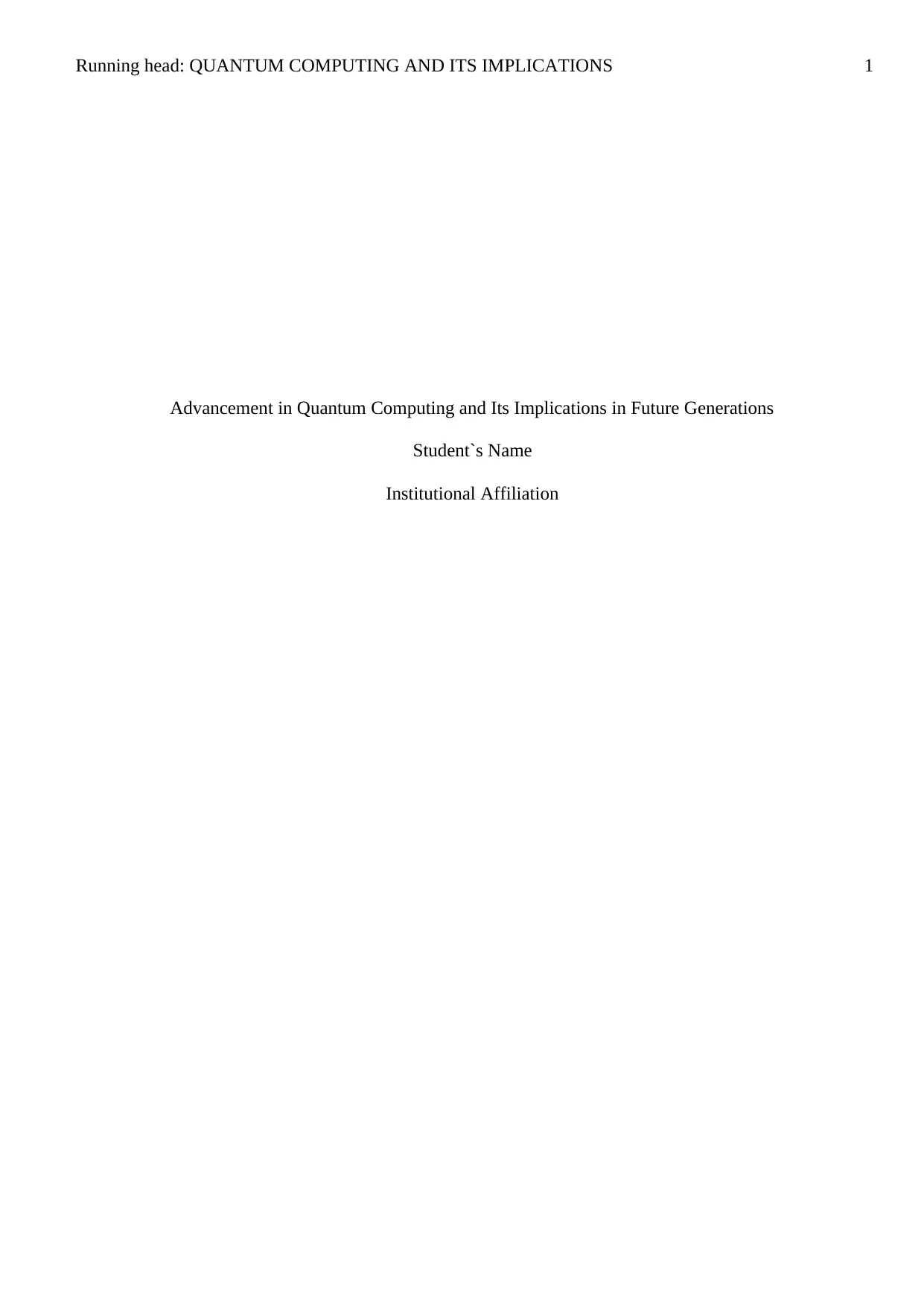
Running head: QUANTUM COMPUTING AND ITS IMPLICATIONS 1
Advancement in Quantum Computing and Its Implications in Future Generations
Student`s Name
Institutional Affiliation
Advancement in Quantum Computing and Its Implications in Future Generations
Student`s Name
Institutional Affiliation
Paraphrase This Document
Need a fresh take? Get an instant paraphrase of this document with our AI Paraphraser
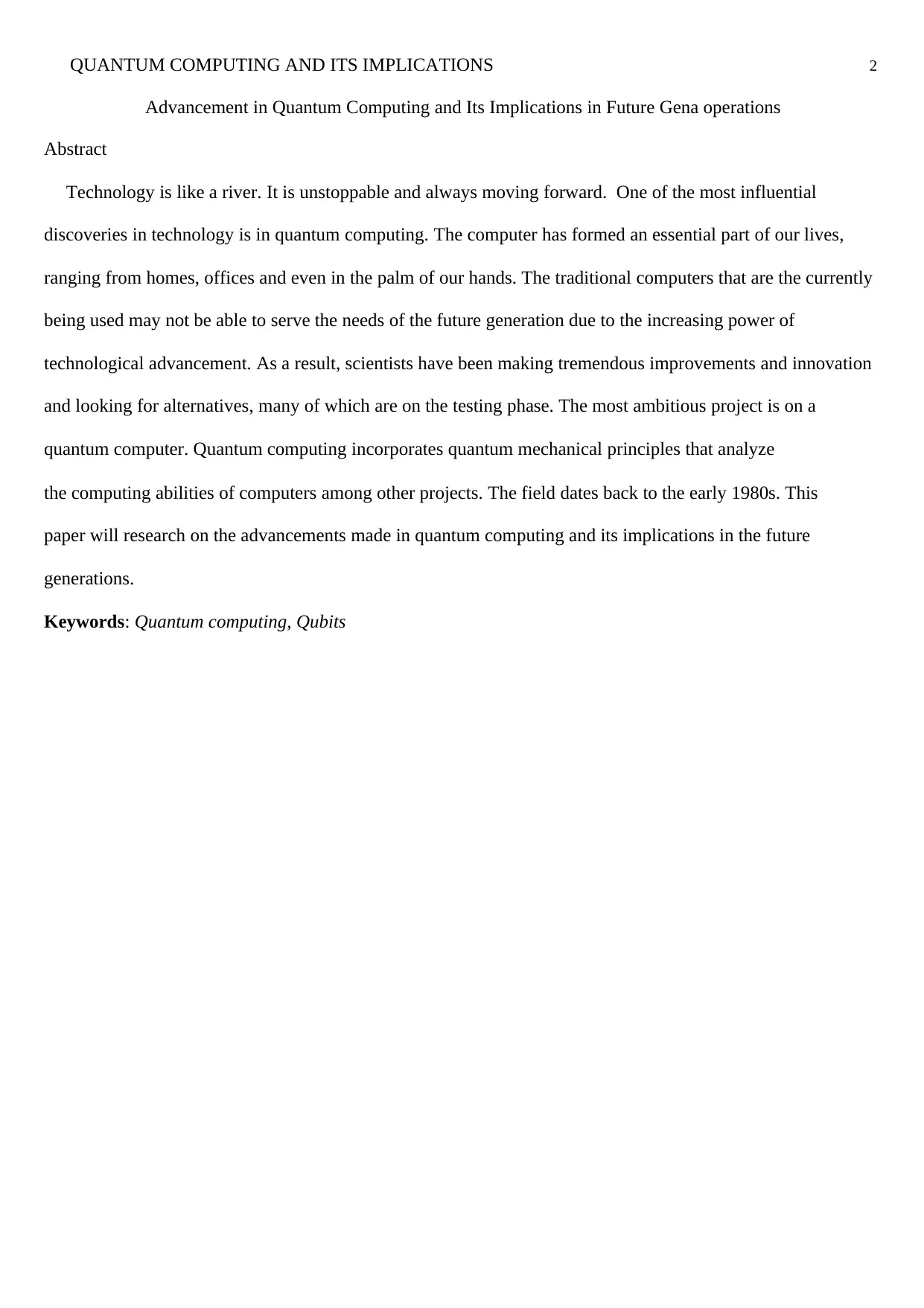
2QUANTUM COMPUTING AND ITS IMPLICATIONS
Advancement in Quantum Computing and Its Implications in Future Gena operations
Abstract
Technology is like a river. It is unstoppable and always moving forward. One of the most influential
discoveries in technology is in quantum computing. The computer has formed an essential part of our lives,
ranging from homes, offices and even in the palm of our hands. The traditional computers that are the currently
being used may not be able to serve the needs of the future generation due to the increasing power of
technological advancement. As a result, scientists have been making tremendous improvements and innovation
and looking for alternatives, many of which are on the testing phase. The most ambitious project is on a
quantum computer. Quantum computing incorporates quantum mechanical principles that analyze
the computing abilities of computers among other projects. The field dates back to the early 1980s. This
paper will research on the advancements made in quantum computing and its implications in the future
generations.
Keywords: Quantum computing, Qubits
Advancement in Quantum Computing and Its Implications in Future Gena operations
Abstract
Technology is like a river. It is unstoppable and always moving forward. One of the most influential
discoveries in technology is in quantum computing. The computer has formed an essential part of our lives,
ranging from homes, offices and even in the palm of our hands. The traditional computers that are the currently
being used may not be able to serve the needs of the future generation due to the increasing power of
technological advancement. As a result, scientists have been making tremendous improvements and innovation
and looking for alternatives, many of which are on the testing phase. The most ambitious project is on a
quantum computer. Quantum computing incorporates quantum mechanical principles that analyze
the computing abilities of computers among other projects. The field dates back to the early 1980s. This
paper will research on the advancements made in quantum computing and its implications in the future
generations.
Keywords: Quantum computing, Qubits
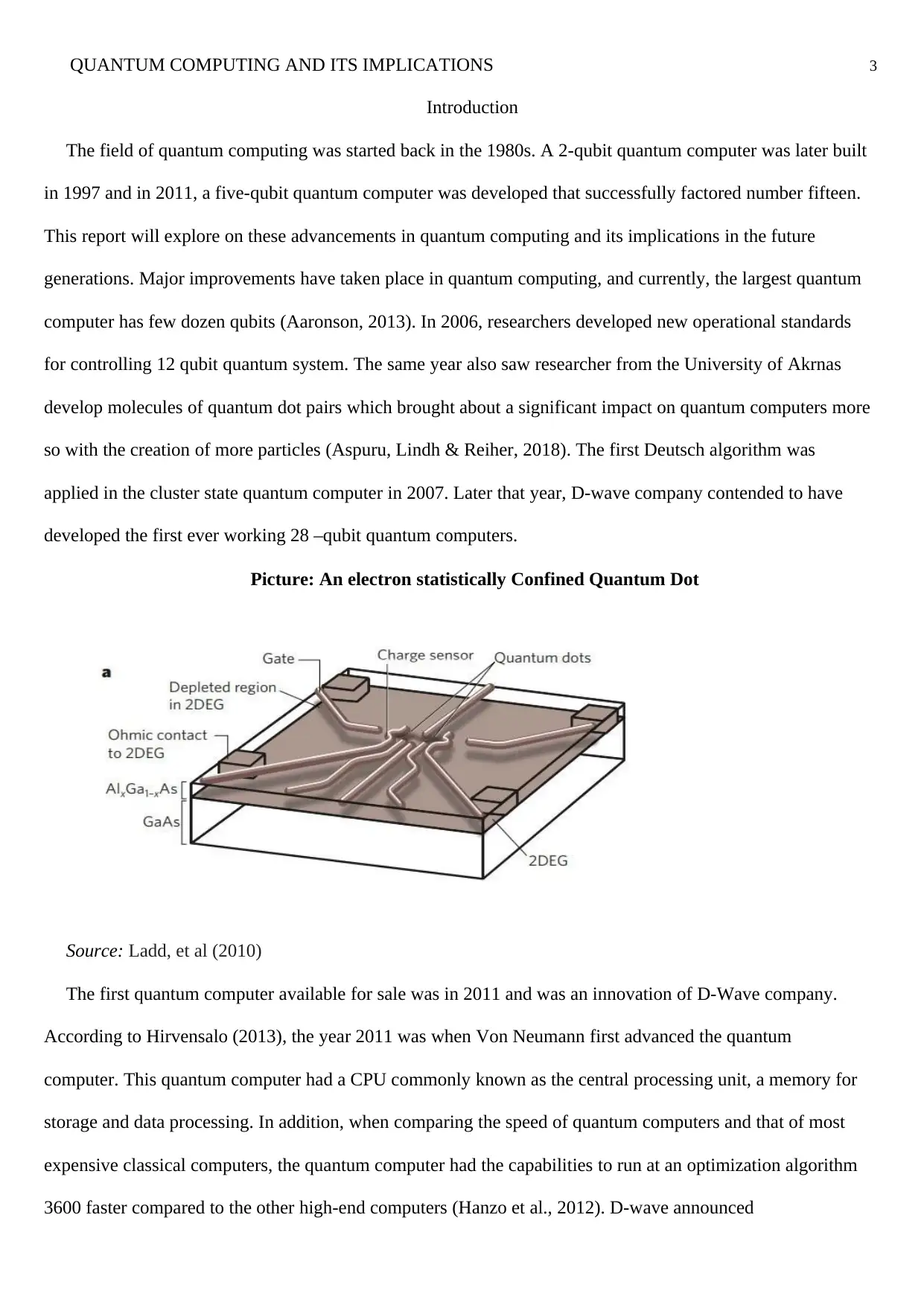
3QUANTUM COMPUTING AND ITS IMPLICATIONS
Introduction
The field of quantum computing was started back in the 1980s. A 2-qubit quantum computer was later built
in 1997 and in 2011, a five-qubit quantum computer was developed that successfully factored number fifteen.
This report will explore on these advancements in quantum computing and its implications in the future
generations. Major improvements have taken place in quantum computing, and currently, the largest quantum
computer has few dozen qubits (Aaronson, 2013). In 2006, researchers developed new operational standards
for controlling 12 qubit quantum system. The same year also saw researcher from the University of Akrnas
develop molecules of quantum dot pairs which brought about a significant impact on quantum computers more
so with the creation of more particles (Aspuru, Lindh & Reiher, 2018). The first Deutsch algorithm was
applied in the cluster state quantum computer in 2007. Later that year, D-wave company contended to have
developed the first ever working 28 –qubit quantum computers.
Picture: An electron statistically Confined Quantum Dot
Source: Ladd, et al (2010)
The first quantum computer available for sale was in 2011 and was an innovation of D-Wave company.
According to Hirvensalo (2013), the year 2011 was when Von Neumann first advanced the quantum
computer. This quantum computer had a CPU commonly known as the central processing unit, a memory for
storage and data processing. In addition, when comparing the speed of quantum computers and that of most
expensive classical computers, the quantum computer had the capabilities to run at an optimization algorithm
3600 faster compared to the other high-end computers (Hanzo et al., 2012). D-wave announced
Introduction
The field of quantum computing was started back in the 1980s. A 2-qubit quantum computer was later built
in 1997 and in 2011, a five-qubit quantum computer was developed that successfully factored number fifteen.
This report will explore on these advancements in quantum computing and its implications in the future
generations. Major improvements have taken place in quantum computing, and currently, the largest quantum
computer has few dozen qubits (Aaronson, 2013). In 2006, researchers developed new operational standards
for controlling 12 qubit quantum system. The same year also saw researcher from the University of Akrnas
develop molecules of quantum dot pairs which brought about a significant impact on quantum computers more
so with the creation of more particles (Aspuru, Lindh & Reiher, 2018). The first Deutsch algorithm was
applied in the cluster state quantum computer in 2007. Later that year, D-wave company contended to have
developed the first ever working 28 –qubit quantum computers.
Picture: An electron statistically Confined Quantum Dot
Source: Ladd, et al (2010)
The first quantum computer available for sale was in 2011 and was an innovation of D-Wave company.
According to Hirvensalo (2013), the year 2011 was when Von Neumann first advanced the quantum
computer. This quantum computer had a CPU commonly known as the central processing unit, a memory for
storage and data processing. In addition, when comparing the speed of quantum computers and that of most
expensive classical computers, the quantum computer had the capabilities to run at an optimization algorithm
3600 faster compared to the other high-end computers (Hanzo et al., 2012). D-wave announced
⊘ This is a preview!⊘
Do you want full access?
Subscribe today to unlock all pages.

Trusted by 1+ million students worldwide
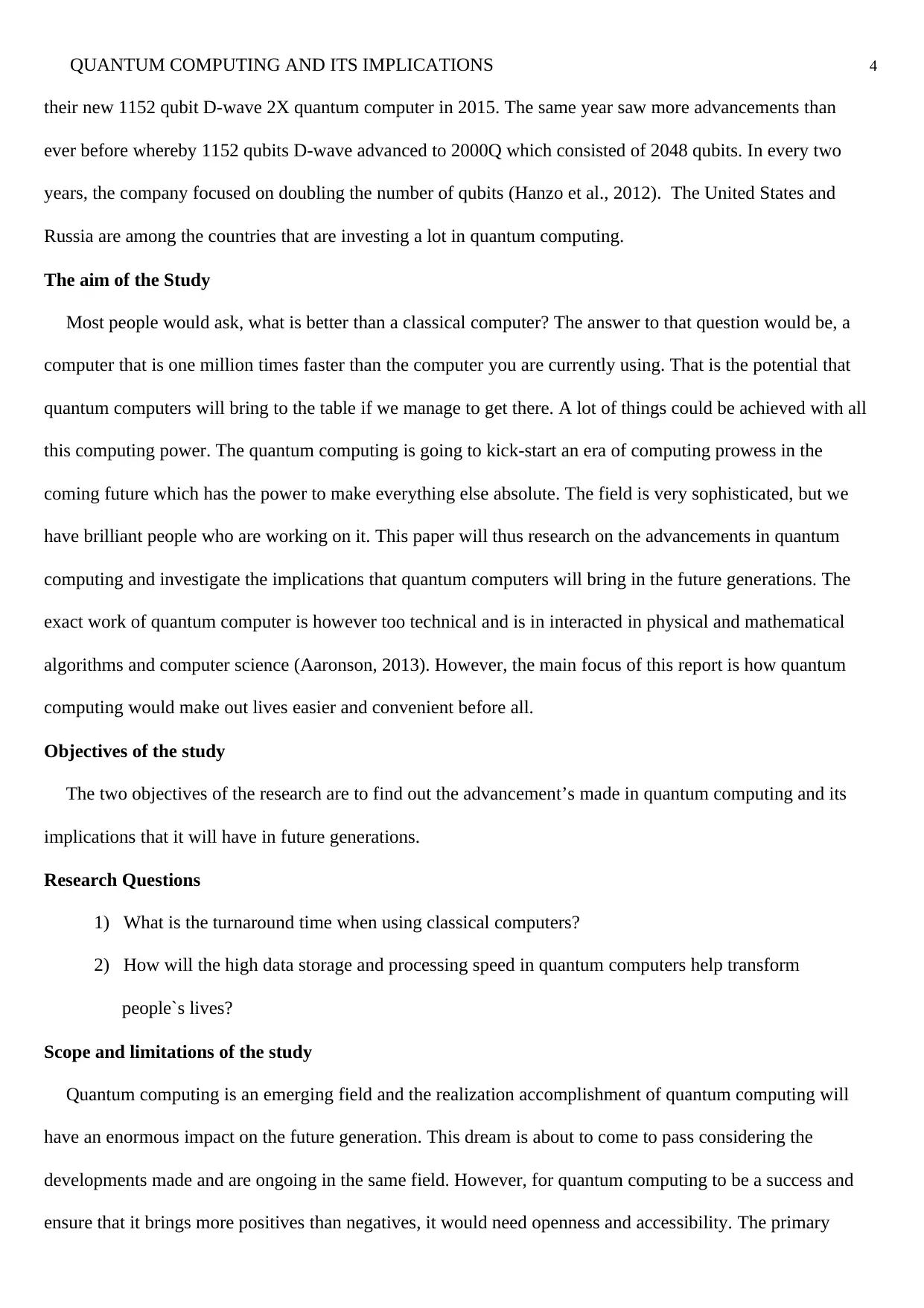
4QUANTUM COMPUTING AND ITS IMPLICATIONS
their new 1152 qubit D-wave 2X quantum computer in 2015. The same year saw more advancements than
ever before whereby 1152 qubits D-wave advanced to 2000Q which consisted of 2048 qubits. In every two
years, the company focused on doubling the number of qubits (Hanzo et al., 2012). The United States and
Russia are among the countries that are investing a lot in quantum computing.
The aim of the Study
Most people would ask, what is better than a classical computer? The answer to that question would be, a
computer that is one million times faster than the computer you are currently using. That is the potential that
quantum computers will bring to the table if we manage to get there. A lot of things could be achieved with all
this computing power. The quantum computing is going to kick-start an era of computing prowess in the
coming future which has the power to make everything else absolute. The field is very sophisticated, but we
have brilliant people who are working on it. This paper will thus research on the advancements in quantum
computing and investigate the implications that quantum computers will bring in the future generations. The
exact work of quantum computer is however too technical and is in interacted in physical and mathematical
algorithms and computer science (Aaronson, 2013). However, the main focus of this report is how quantum
computing would make out lives easier and convenient before all.
Objectives of the study
The two objectives of the research are to find out the advancement’s made in quantum computing and its
implications that it will have in future generations.
Research Questions
1) What is the turnaround time when using classical computers?
2) How will the high data storage and processing speed in quantum computers help transform
people`s lives?
Scope and limitations of the study
Quantum computing is an emerging field and the realization accomplishment of quantum computing will
have an enormous impact on the future generation. This dream is about to come to pass considering the
developments made and are ongoing in the same field. However, for quantum computing to be a success and
ensure that it brings more positives than negatives, it would need openness and accessibility. The primary
their new 1152 qubit D-wave 2X quantum computer in 2015. The same year saw more advancements than
ever before whereby 1152 qubits D-wave advanced to 2000Q which consisted of 2048 qubits. In every two
years, the company focused on doubling the number of qubits (Hanzo et al., 2012). The United States and
Russia are among the countries that are investing a lot in quantum computing.
The aim of the Study
Most people would ask, what is better than a classical computer? The answer to that question would be, a
computer that is one million times faster than the computer you are currently using. That is the potential that
quantum computers will bring to the table if we manage to get there. A lot of things could be achieved with all
this computing power. The quantum computing is going to kick-start an era of computing prowess in the
coming future which has the power to make everything else absolute. The field is very sophisticated, but we
have brilliant people who are working on it. This paper will thus research on the advancements in quantum
computing and investigate the implications that quantum computers will bring in the future generations. The
exact work of quantum computer is however too technical and is in interacted in physical and mathematical
algorithms and computer science (Aaronson, 2013). However, the main focus of this report is how quantum
computing would make out lives easier and convenient before all.
Objectives of the study
The two objectives of the research are to find out the advancement’s made in quantum computing and its
implications that it will have in future generations.
Research Questions
1) What is the turnaround time when using classical computers?
2) How will the high data storage and processing speed in quantum computers help transform
people`s lives?
Scope and limitations of the study
Quantum computing is an emerging field and the realization accomplishment of quantum computing will
have an enormous impact on the future generation. This dream is about to come to pass considering the
developments made and are ongoing in the same field. However, for quantum computing to be a success and
ensure that it brings more positives than negatives, it would need openness and accessibility. The primary
Paraphrase This Document
Need a fresh take? Get an instant paraphrase of this document with our AI Paraphraser
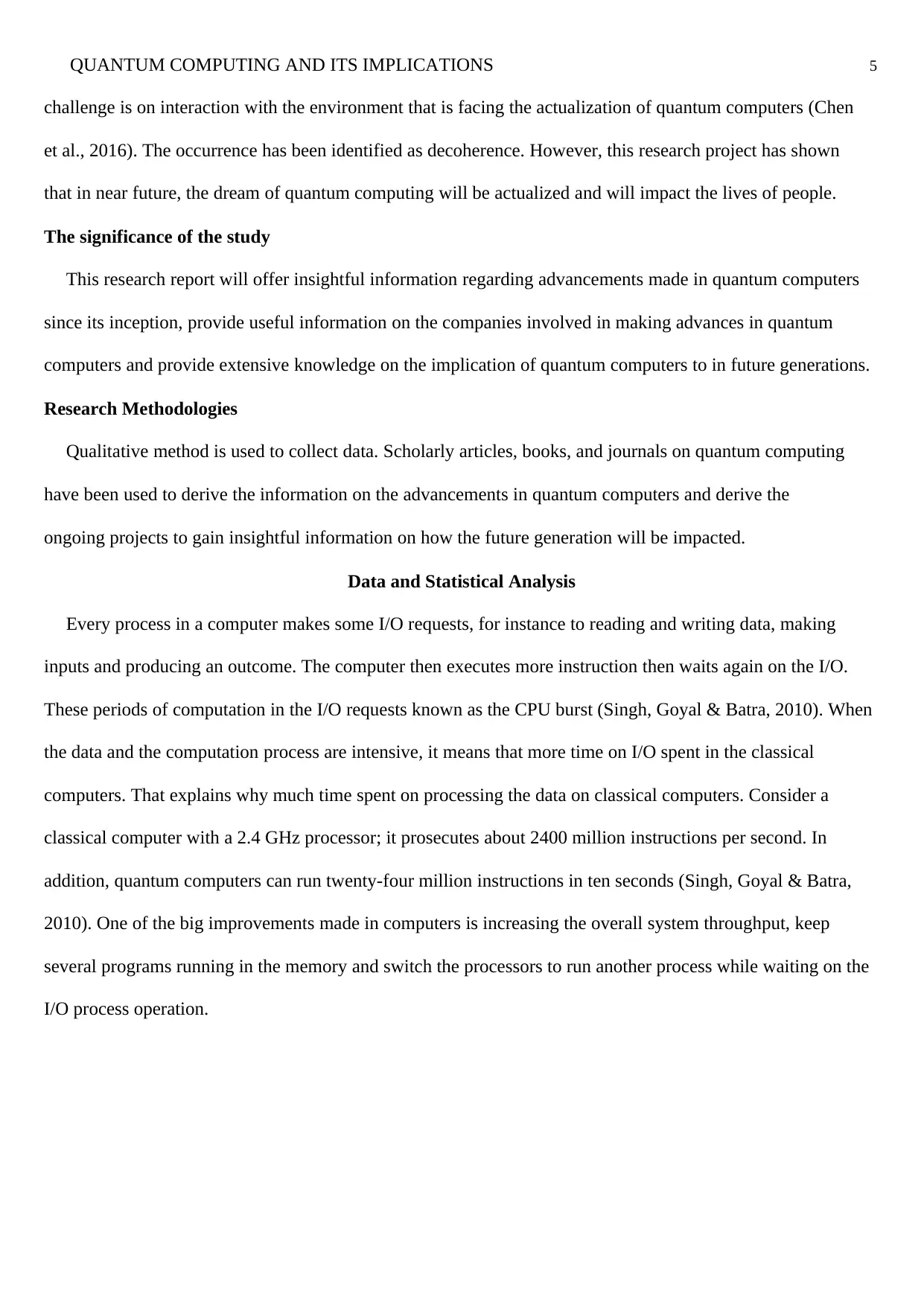
5QUANTUM COMPUTING AND ITS IMPLICATIONS
challenge is on interaction with the environment that is facing the actualization of quantum computers (Chen
et al., 2016). The occurrence has been identified as decoherence. However, this research project has shown
that in near future, the dream of quantum computing will be actualized and will impact the lives of people.
The significance of the study
This research report will offer insightful information regarding advancements made in quantum computers
since its inception, provide useful information on the companies involved in making advances in quantum
computers and provide extensive knowledge on the implication of quantum computers to in future generations.
Research Methodologies
Qualitative method is used to collect data. Scholarly articles, books, and journals on quantum computing
have been used to derive the information on the advancements in quantum computers and derive the
ongoing projects to gain insightful information on how the future generation will be impacted.
Data and Statistical Analysis
Every process in a computer makes some I/O requests, for instance to reading and writing data, making
inputs and producing an outcome. The computer then executes more instruction then waits again on the I/O.
These periods of computation in the I/O requests known as the CPU burst (Singh, Goyal & Batra, 2010). When
the data and the computation process are intensive, it means that more time on I/O spent in the classical
computers. That explains why much time spent on processing the data on classical computers. Consider a
classical computer with a 2.4 GHz processor; it prosecutes about 2400 million instructions per second. In
addition, quantum computers can run twenty-four million instructions in ten seconds (Singh, Goyal & Batra,
2010). One of the big improvements made in computers is increasing the overall system throughput, keep
several programs running in the memory and switch the processors to run another process while waiting on the
I/O process operation.
challenge is on interaction with the environment that is facing the actualization of quantum computers (Chen
et al., 2016). The occurrence has been identified as decoherence. However, this research project has shown
that in near future, the dream of quantum computing will be actualized and will impact the lives of people.
The significance of the study
This research report will offer insightful information regarding advancements made in quantum computers
since its inception, provide useful information on the companies involved in making advances in quantum
computers and provide extensive knowledge on the implication of quantum computers to in future generations.
Research Methodologies
Qualitative method is used to collect data. Scholarly articles, books, and journals on quantum computing
have been used to derive the information on the advancements in quantum computers and derive the
ongoing projects to gain insightful information on how the future generation will be impacted.
Data and Statistical Analysis
Every process in a computer makes some I/O requests, for instance to reading and writing data, making
inputs and producing an outcome. The computer then executes more instruction then waits again on the I/O.
These periods of computation in the I/O requests known as the CPU burst (Singh, Goyal & Batra, 2010). When
the data and the computation process are intensive, it means that more time on I/O spent in the classical
computers. That explains why much time spent on processing the data on classical computers. Consider a
classical computer with a 2.4 GHz processor; it prosecutes about 2400 million instructions per second. In
addition, quantum computers can run twenty-four million instructions in ten seconds (Singh, Goyal & Batra,
2010). One of the big improvements made in computers is increasing the overall system throughput, keep
several programs running in the memory and switch the processors to run another process while waiting on the
I/O process operation.
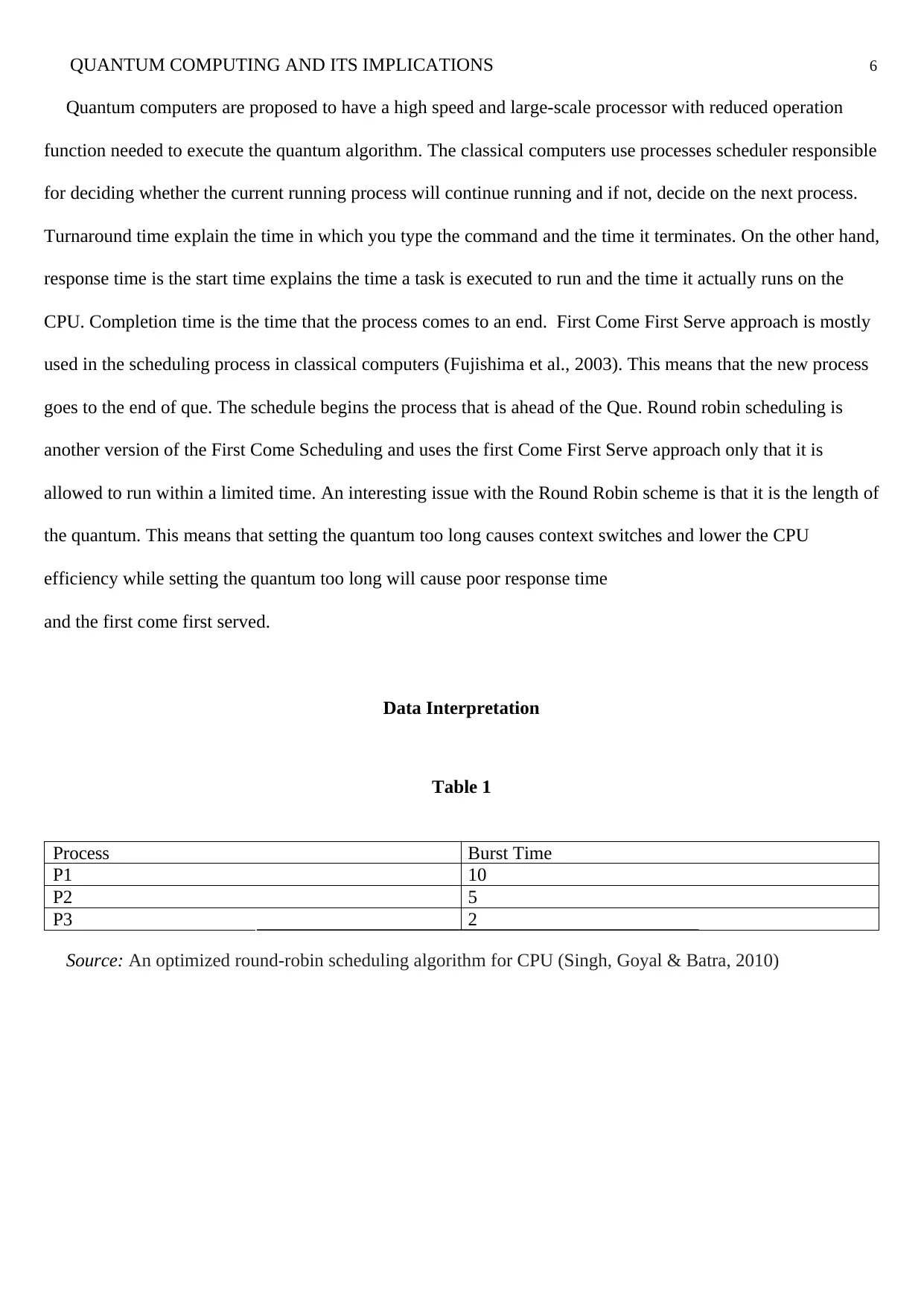
6QUANTUM COMPUTING AND ITS IMPLICATIONS
Quantum computers are proposed to have a high speed and large-scale processor with reduced operation
function needed to execute the quantum algorithm. The classical computers use processes scheduler responsible
for deciding whether the current running process will continue running and if not, decide on the next process.
Turnaround time explain the time in which you type the command and the time it terminates. On the other hand,
response time is the start time explains the time a task is executed to run and the time it actually runs on the
CPU. Completion time is the time that the process comes to an end. First Come First Serve approach is mostly
used in the scheduling process in classical computers (Fujishima et al., 2003). This means that the new process
goes to the end of que. The schedule begins the process that is ahead of the Que. Round robin scheduling is
another version of the First Come Scheduling and uses the first Come First Serve approach only that it is
allowed to run within a limited time. An interesting issue with the Round Robin scheme is that it is the length of
the quantum. This means that setting the quantum too long causes context switches and lower the CPU
efficiency while setting the quantum too long will cause poor response time
and the first come first served.
Data Interpretation
Table 1
Process Burst Time
P1 10
P2 5
P3 2
Source: An optimized round-robin scheduling algorithm for CPU (Singh, Goyal & Batra, 2010)
Quantum computers are proposed to have a high speed and large-scale processor with reduced operation
function needed to execute the quantum algorithm. The classical computers use processes scheduler responsible
for deciding whether the current running process will continue running and if not, decide on the next process.
Turnaround time explain the time in which you type the command and the time it terminates. On the other hand,
response time is the start time explains the time a task is executed to run and the time it actually runs on the
CPU. Completion time is the time that the process comes to an end. First Come First Serve approach is mostly
used in the scheduling process in classical computers (Fujishima et al., 2003). This means that the new process
goes to the end of que. The schedule begins the process that is ahead of the Que. Round robin scheduling is
another version of the First Come Scheduling and uses the first Come First Serve approach only that it is
allowed to run within a limited time. An interesting issue with the Round Robin scheme is that it is the length of
the quantum. This means that setting the quantum too long causes context switches and lower the CPU
efficiency while setting the quantum too long will cause poor response time
and the first come first served.
Data Interpretation
Table 1
Process Burst Time
P1 10
P2 5
P3 2
Source: An optimized round-robin scheduling algorithm for CPU (Singh, Goyal & Batra, 2010)
⊘ This is a preview!⊘
Do you want full access?
Subscribe today to unlock all pages.

Trusted by 1+ million students worldwide
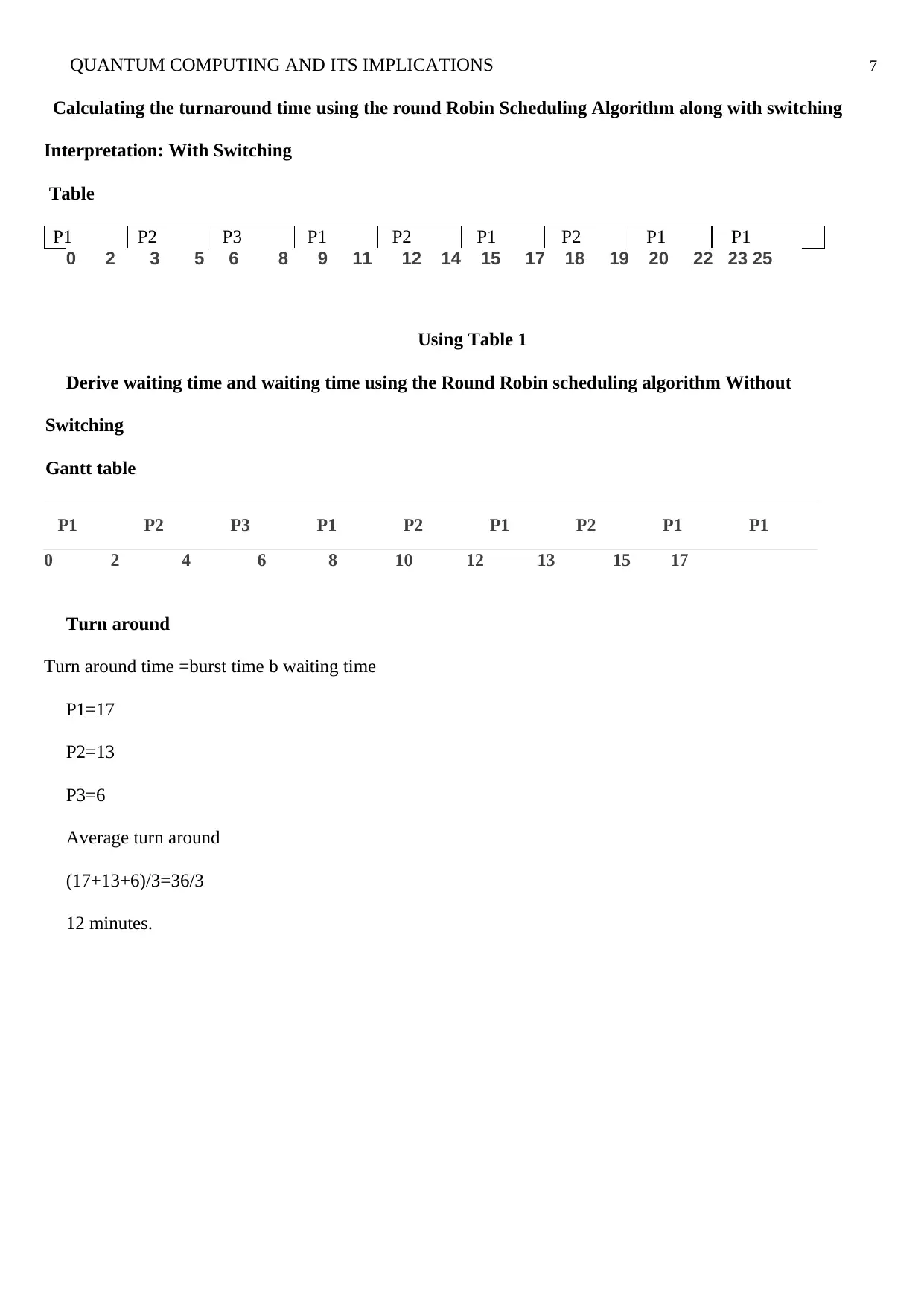
7QUANTUM COMPUTING AND ITS IMPLICATIONS
Calculating the turnaround time using the round Robin Scheduling Algorithm along with switching
Interpretation: With Switching
Table
P1 P2 P3 P1 P2 P1 P2 P1 P1
0 2 3 5 6 8 9 11 12 14 15 17 18 19 20 22 23 25
Using Table 1
Derive waiting time and waiting time using the Round Robin scheduling algorithm Without
Switching
Gantt table
P1 P2 P3 P1 P2 P1 P2 P1 P1
0 2 4 6 8 10 12 13 15 17
Turn around
Turn around time =burst time b waiting time
P1=17
P2=13
P3=6
Average turn around
(17+13+6)/3=36/3
12 minutes.
Calculating the turnaround time using the round Robin Scheduling Algorithm along with switching
Interpretation: With Switching
Table
P1 P2 P3 P1 P2 P1 P2 P1 P1
0 2 3 5 6 8 9 11 12 14 15 17 18 19 20 22 23 25
Using Table 1
Derive waiting time and waiting time using the Round Robin scheduling algorithm Without
Switching
Gantt table
P1 P2 P3 P1 P2 P1 P2 P1 P1
0 2 4 6 8 10 12 13 15 17
Turn around
Turn around time =burst time b waiting time
P1=17
P2=13
P3=6
Average turn around
(17+13+6)/3=36/3
12 minutes.
Paraphrase This Document
Need a fresh take? Get an instant paraphrase of this document with our AI Paraphraser
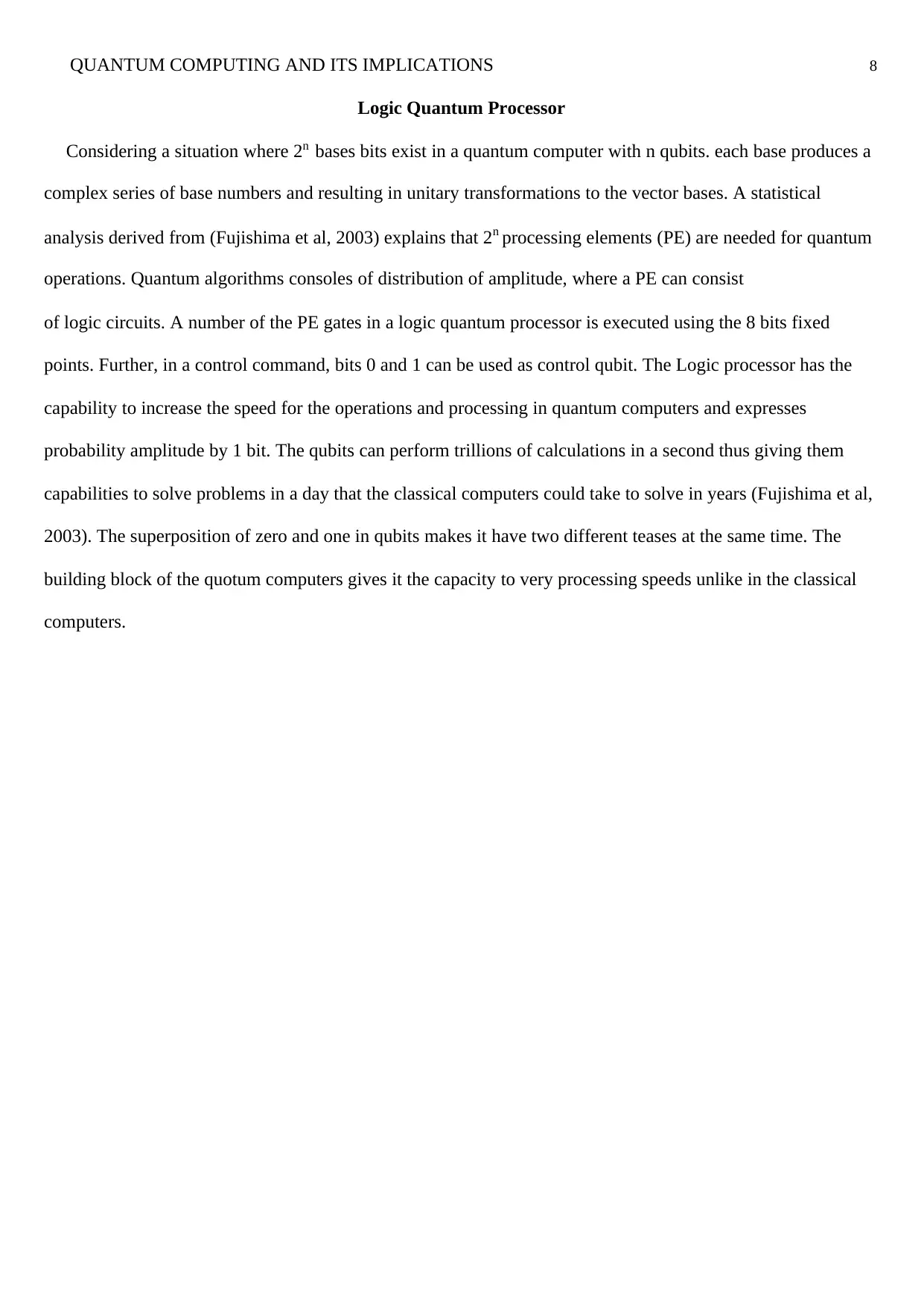
8QUANTUM COMPUTING AND ITS IMPLICATIONS
Logic Quantum Processor
Considering a situation where 2n bases bits exist in a quantum computer with n qubits. each base produces a
complex series of base numbers and resulting in unitary transformations to the vector bases. A statistical
analysis derived from (Fujishima et al, 2003) explains that 2n processing elements (PE) are needed for quantum
operations. Quantum algorithms consoles of distribution of amplitude, where a PE can consist
of logic circuits. A number of the PE gates in a logic quantum processor is executed using the 8 bits fixed
points. Further, in a control command, bits 0 and 1 can be used as control qubit. The Logic processor has the
capability to increase the speed for the operations and processing in quantum computers and expresses
probability amplitude by 1 bit. The qubits can perform trillions of calculations in a second thus giving them
capabilities to solve problems in a day that the classical computers could take to solve in years (Fujishima et al,
2003). The superposition of zero and one in qubits makes it have two different teases at the same time. The
building block of the quotum computers gives it the capacity to very processing speeds unlike in the classical
computers.
Logic Quantum Processor
Considering a situation where 2n bases bits exist in a quantum computer with n qubits. each base produces a
complex series of base numbers and resulting in unitary transformations to the vector bases. A statistical
analysis derived from (Fujishima et al, 2003) explains that 2n processing elements (PE) are needed for quantum
operations. Quantum algorithms consoles of distribution of amplitude, where a PE can consist
of logic circuits. A number of the PE gates in a logic quantum processor is executed using the 8 bits fixed
points. Further, in a control command, bits 0 and 1 can be used as control qubit. The Logic processor has the
capability to increase the speed for the operations and processing in quantum computers and expresses
probability amplitude by 1 bit. The qubits can perform trillions of calculations in a second thus giving them
capabilities to solve problems in a day that the classical computers could take to solve in years (Fujishima et al,
2003). The superposition of zero and one in qubits makes it have two different teases at the same time. The
building block of the quotum computers gives it the capacity to very processing speeds unlike in the classical
computers.
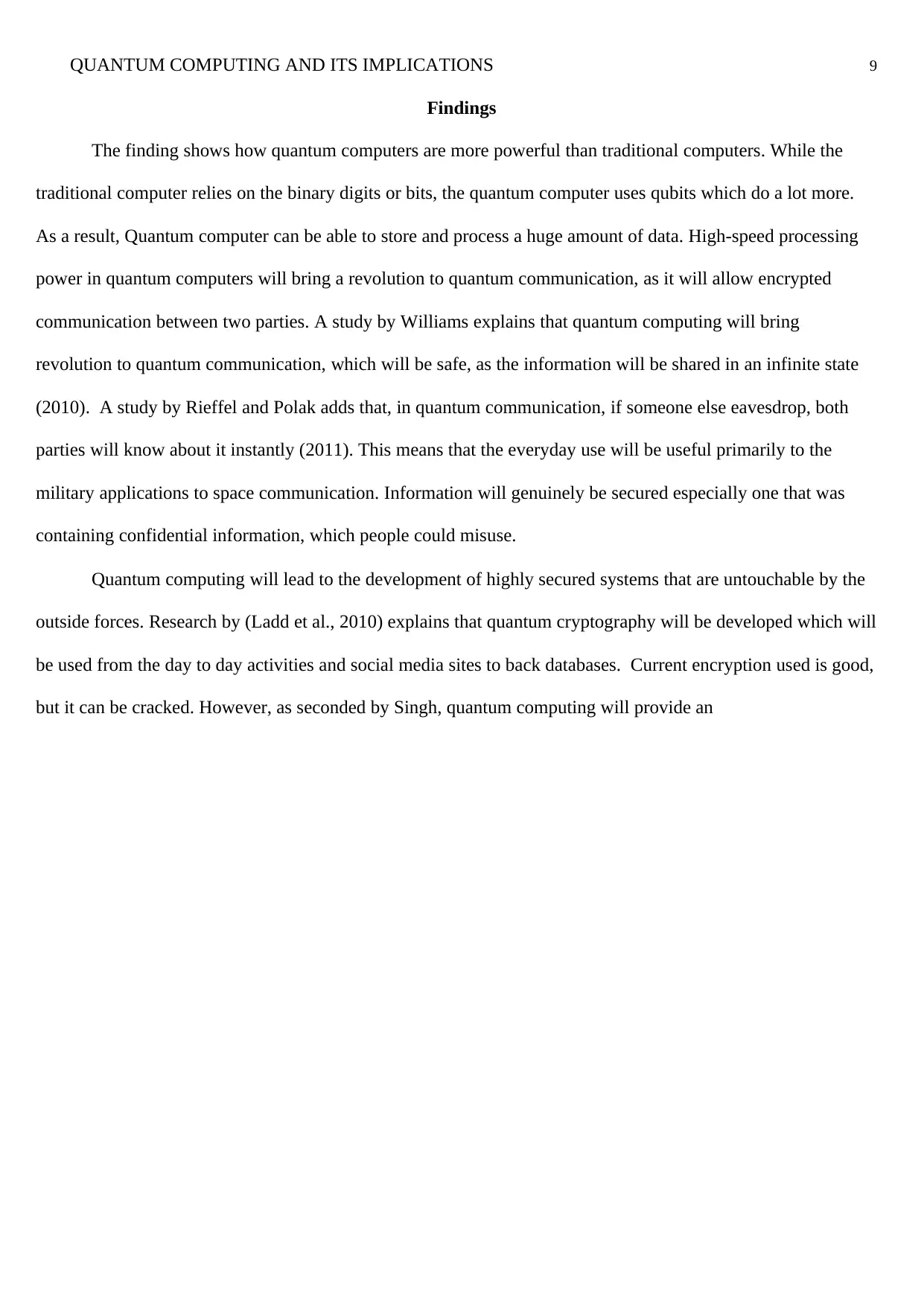
9QUANTUM COMPUTING AND ITS IMPLICATIONS
Findings
The finding shows how quantum computers are more powerful than traditional computers. While the
traditional computer relies on the binary digits or bits, the quantum computer uses qubits which do a lot more.
As a result, Quantum computer can be able to store and process a huge amount of data. High-speed processing
power in quantum computers will bring a revolution to quantum communication, as it will allow encrypted
communication between two parties. A study by Williams explains that quantum computing will bring
revolution to quantum communication, which will be safe, as the information will be shared in an infinite state
(2010). A study by Rieffel and Polak adds that, in quantum communication, if someone else eavesdrop, both
parties will know about it instantly (2011). This means that the everyday use will be useful primarily to the
military applications to space communication. Information will genuinely be secured especially one that was
containing confidential information, which people could misuse.
Quantum computing will lead to the development of highly secured systems that are untouchable by the
outside forces. Research by (Ladd et al., 2010) explains that quantum cryptography will be developed which will
be used from the day to day activities and social media sites to back databases. Current encryption used is good,
but it can be cracked. However, as seconded by Singh, quantum computing will provide an
Findings
The finding shows how quantum computers are more powerful than traditional computers. While the
traditional computer relies on the binary digits or bits, the quantum computer uses qubits which do a lot more.
As a result, Quantum computer can be able to store and process a huge amount of data. High-speed processing
power in quantum computers will bring a revolution to quantum communication, as it will allow encrypted
communication between two parties. A study by Williams explains that quantum computing will bring
revolution to quantum communication, which will be safe, as the information will be shared in an infinite state
(2010). A study by Rieffel and Polak adds that, in quantum communication, if someone else eavesdrop, both
parties will know about it instantly (2011). This means that the everyday use will be useful primarily to the
military applications to space communication. Information will genuinely be secured especially one that was
containing confidential information, which people could misuse.
Quantum computing will lead to the development of highly secured systems that are untouchable by the
outside forces. Research by (Ladd et al., 2010) explains that quantum cryptography will be developed which will
be used from the day to day activities and social media sites to back databases. Current encryption used is good,
but it can be cracked. However, as seconded by Singh, quantum computing will provide an
⊘ This is a preview!⊘
Do you want full access?
Subscribe today to unlock all pages.

Trusted by 1+ million students worldwide
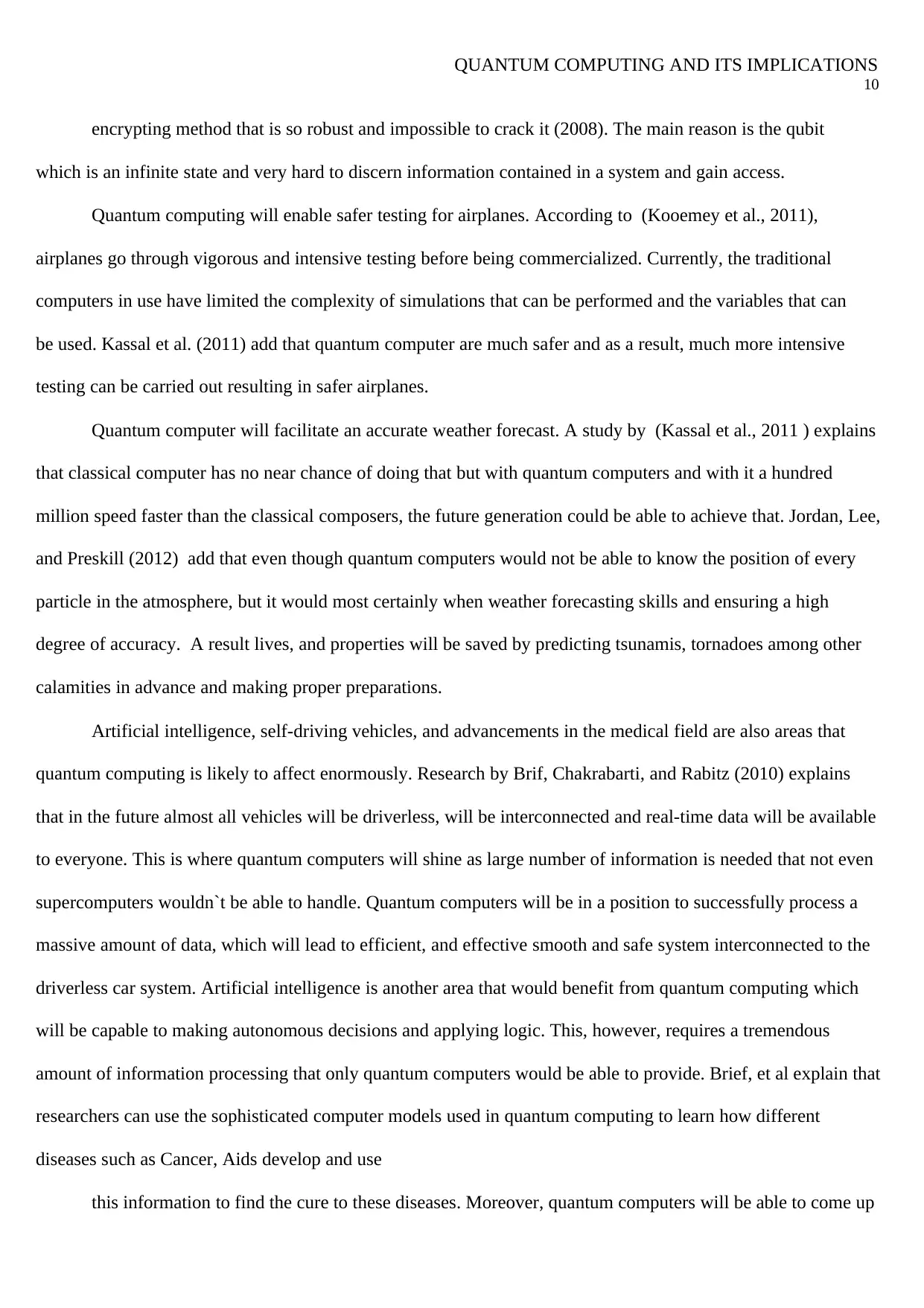
QUANTUM COMPUTING AND ITS IMPLICATIONS
10
encrypting method that is so robust and impossible to crack it (2008). The main reason is the qubit
which is an infinite state and very hard to discern information contained in a system and gain access.
Quantum computing will enable safer testing for airplanes. According to (Kooemey et al., 2011),
airplanes go through vigorous and intensive testing before being commercialized. Currently, the traditional
computers in use have limited the complexity of simulations that can be performed and the variables that can
be used. Kassal et al. (2011) add that quantum computer are much safer and as a result, much more intensive
testing can be carried out resulting in safer airplanes.
Quantum computer will facilitate an accurate weather forecast. A study by (Kassal et al., 2011 ) explains
that classical computer has no near chance of doing that but with quantum computers and with it a hundred
million speed faster than the classical composers, the future generation could be able to achieve that. Jordan, Lee,
and Preskill (2012) add that even though quantum computers would not be able to know the position of every
particle in the atmosphere, but it would most certainly when weather forecasting skills and ensuring a high
degree of accuracy. A result lives, and properties will be saved by predicting tsunamis, tornadoes among other
calamities in advance and making proper preparations.
Artificial intelligence, self-driving vehicles, and advancements in the medical field are also areas that
quantum computing is likely to affect enormously. Research by Brif, Chakrabarti, and Rabitz (2010) explains
that in the future almost all vehicles will be driverless, will be interconnected and real-time data will be available
to everyone. This is where quantum computers will shine as large number of information is needed that not even
supercomputers wouldn`t be able to handle. Quantum computers will be in a position to successfully process a
massive amount of data, which will lead to efficient, and effective smooth and safe system interconnected to the
driverless car system. Artificial intelligence is another area that would benefit from quantum computing which
will be capable to making autonomous decisions and applying logic. This, however, requires a tremendous
amount of information processing that only quantum computers would be able to provide. Brief, et al explain that
researchers can use the sophisticated computer models used in quantum computing to learn how different
diseases such as Cancer, Aids develop and use
this information to find the cure to these diseases. Moreover, quantum computers will be able to come up
10
encrypting method that is so robust and impossible to crack it (2008). The main reason is the qubit
which is an infinite state and very hard to discern information contained in a system and gain access.
Quantum computing will enable safer testing for airplanes. According to (Kooemey et al., 2011),
airplanes go through vigorous and intensive testing before being commercialized. Currently, the traditional
computers in use have limited the complexity of simulations that can be performed and the variables that can
be used. Kassal et al. (2011) add that quantum computer are much safer and as a result, much more intensive
testing can be carried out resulting in safer airplanes.
Quantum computer will facilitate an accurate weather forecast. A study by (Kassal et al., 2011 ) explains
that classical computer has no near chance of doing that but with quantum computers and with it a hundred
million speed faster than the classical composers, the future generation could be able to achieve that. Jordan, Lee,
and Preskill (2012) add that even though quantum computers would not be able to know the position of every
particle in the atmosphere, but it would most certainly when weather forecasting skills and ensuring a high
degree of accuracy. A result lives, and properties will be saved by predicting tsunamis, tornadoes among other
calamities in advance and making proper preparations.
Artificial intelligence, self-driving vehicles, and advancements in the medical field are also areas that
quantum computing is likely to affect enormously. Research by Brif, Chakrabarti, and Rabitz (2010) explains
that in the future almost all vehicles will be driverless, will be interconnected and real-time data will be available
to everyone. This is where quantum computers will shine as large number of information is needed that not even
supercomputers wouldn`t be able to handle. Quantum computers will be in a position to successfully process a
massive amount of data, which will lead to efficient, and effective smooth and safe system interconnected to the
driverless car system. Artificial intelligence is another area that would benefit from quantum computing which
will be capable to making autonomous decisions and applying logic. This, however, requires a tremendous
amount of information processing that only quantum computers would be able to provide. Brief, et al explain that
researchers can use the sophisticated computer models used in quantum computing to learn how different
diseases such as Cancer, Aids develop and use
this information to find the cure to these diseases. Moreover, quantum computers will be able to come up
Paraphrase This Document
Need a fresh take? Get an instant paraphrase of this document with our AI Paraphraser
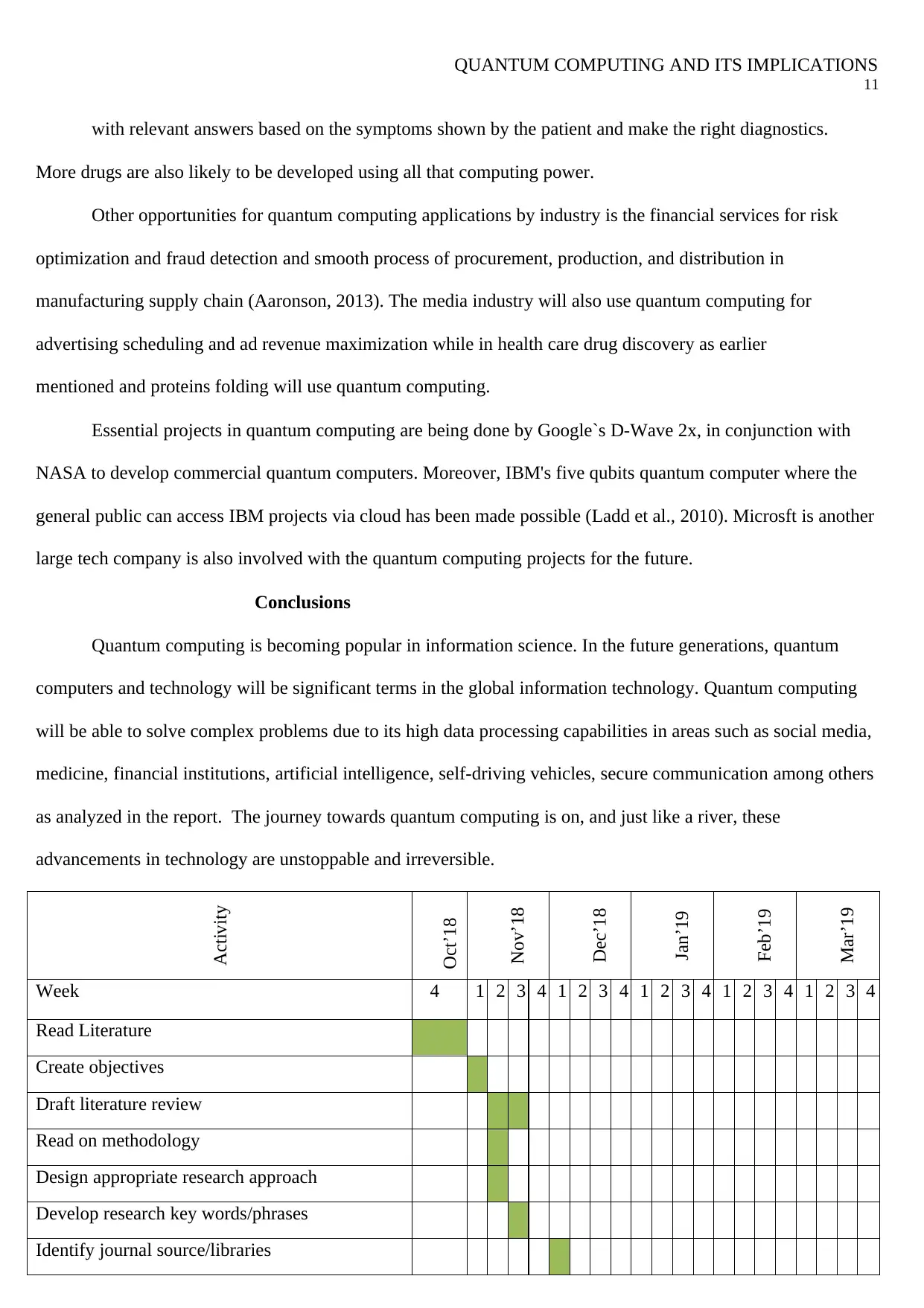
QUANTUM COMPUTING AND ITS IMPLICATIONS
11
with relevant answers based on the symptoms shown by the patient and make the right diagnostics.
More drugs are also likely to be developed using all that computing power.
Other opportunities for quantum computing applications by industry is the financial services for risk
optimization and fraud detection and smooth process of procurement, production, and distribution in
manufacturing supply chain (Aaronson, 2013). The media industry will also use quantum computing for
advertising scheduling and ad revenue maximization while in health care drug discovery as earlier
mentioned and proteins folding will use quantum computing.
Essential projects in quantum computing are being done by Google`s D-Wave 2x, in conjunction with
NASA to develop commercial quantum computers. Moreover, IBM's five qubits quantum computer where the
general public can access IBM projects via cloud has been made possible (Ladd et al., 2010). Microsft is another
large tech company is also involved with the quantum computing projects for the future.
Conclusions
Quantum computing is becoming popular in information science. In the future generations, quantum
computers and technology will be significant terms in the global information technology. Quantum computing
will be able to solve complex problems due to its high data processing capabilities in areas such as social media,
medicine, financial institutions, artificial intelligence, self-driving vehicles, secure communication among others
as analyzed in the report. The journey towards quantum computing is on, and just like a river, these
advancements in technology are unstoppable and irreversible.
Activity
Oct’18
Nov’18
Dec’18
Jan’19
Feb’19
Mar’19
Week 4 1 2 3 4 1 2 3 4 1 2 3 4 1 2 3 4 1 2 3 4
Read Literature
Create objectives
Draft literature review
Read on methodology
Design appropriate research approach
Develop research key words/phrases
Identify journal source/libraries
11
with relevant answers based on the symptoms shown by the patient and make the right diagnostics.
More drugs are also likely to be developed using all that computing power.
Other opportunities for quantum computing applications by industry is the financial services for risk
optimization and fraud detection and smooth process of procurement, production, and distribution in
manufacturing supply chain (Aaronson, 2013). The media industry will also use quantum computing for
advertising scheduling and ad revenue maximization while in health care drug discovery as earlier
mentioned and proteins folding will use quantum computing.
Essential projects in quantum computing are being done by Google`s D-Wave 2x, in conjunction with
NASA to develop commercial quantum computers. Moreover, IBM's five qubits quantum computer where the
general public can access IBM projects via cloud has been made possible (Ladd et al., 2010). Microsft is another
large tech company is also involved with the quantum computing projects for the future.
Conclusions
Quantum computing is becoming popular in information science. In the future generations, quantum
computers and technology will be significant terms in the global information technology. Quantum computing
will be able to solve complex problems due to its high data processing capabilities in areas such as social media,
medicine, financial institutions, artificial intelligence, self-driving vehicles, secure communication among others
as analyzed in the report. The journey towards quantum computing is on, and just like a river, these
advancements in technology are unstoppable and irreversible.
Activity
Oct’18
Nov’18
Dec’18
Jan’19
Feb’19
Mar’19
Week 4 1 2 3 4 1 2 3 4 1 2 3 4 1 2 3 4 1 2 3 4
Read Literature
Create objectives
Draft literature review
Read on methodology
Design appropriate research approach
Develop research key words/phrases
Identify journal source/libraries
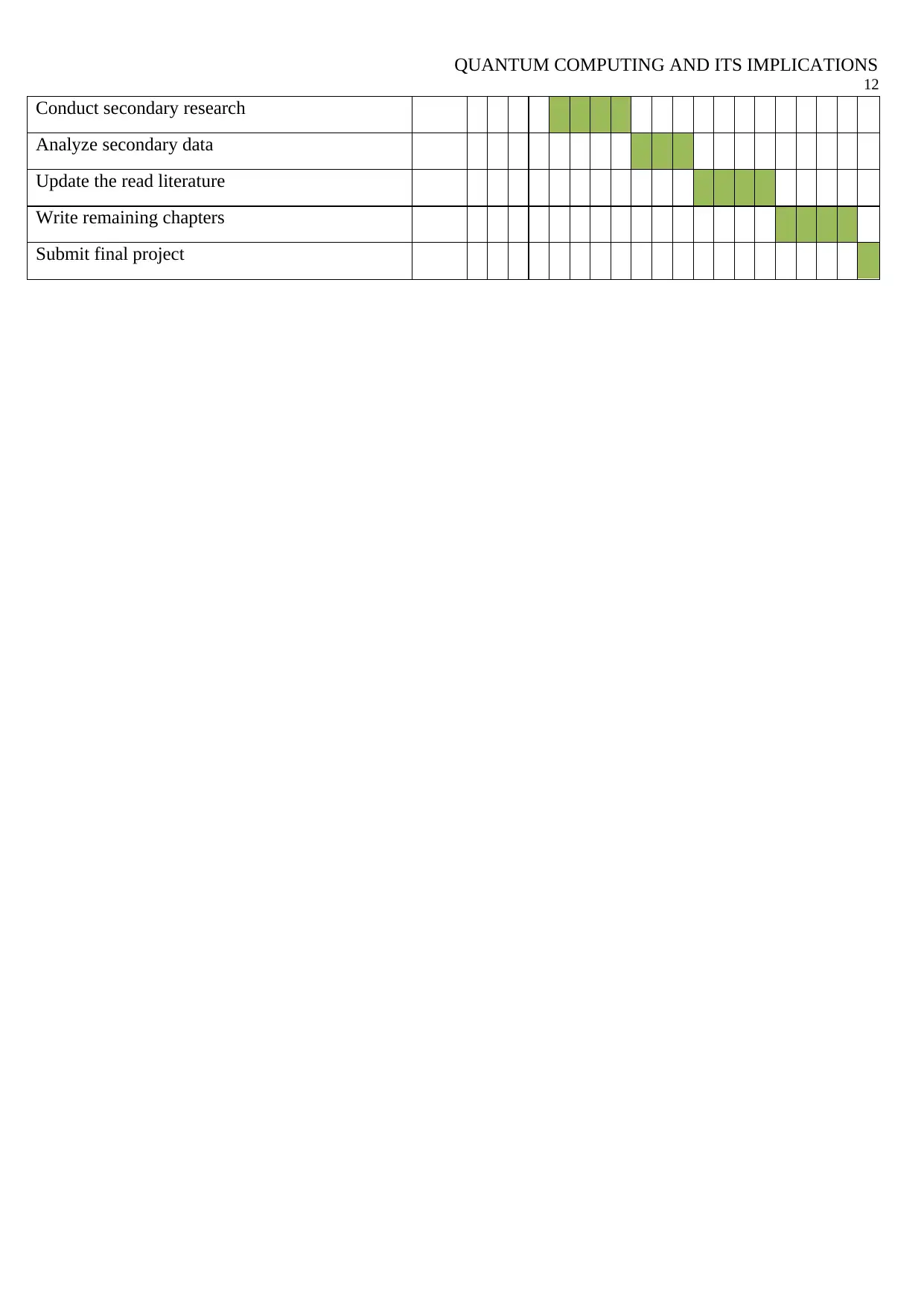
QUANTUM COMPUTING AND ITS IMPLICATIONS
12
Conduct secondary research
Analyze secondary data
Update the read literature
Write remaining chapters
Submit final project
12
Conduct secondary research
Analyze secondary data
Update the read literature
Write remaining chapters
Submit final project
⊘ This is a preview!⊘
Do you want full access?
Subscribe today to unlock all pages.

Trusted by 1+ million students worldwide
1 out of 13
Related Documents
Your All-in-One AI-Powered Toolkit for Academic Success.
+13062052269
info@desklib.com
Available 24*7 on WhatsApp / Email
![[object Object]](/_next/static/media/star-bottom.7253800d.svg)
Unlock your academic potential
Copyright © 2020–2026 A2Z Services. All Rights Reserved. Developed and managed by ZUCOL.



